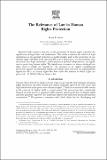| dc.description.abstract |
Relatively little empirical research on the protection of human rights considers the significance of legal rules and institutions. This article examines the effects of legal institutions on the general protection of political rights and on the protection of one discrete right—freedom from unreasonable search and seizure. A cross-sectional anal- ysis reveals that legal institutions, and in particular judicial independence, are signifi- cant in protecting human rights. The significance remains even when extralegal vari- ables, such as wealth, are considered. The presence of an explicit constitutional protection against unreasonable search and seizure does not have an independently significant effect on human rights but does affect the manner in which rights are protected. |

